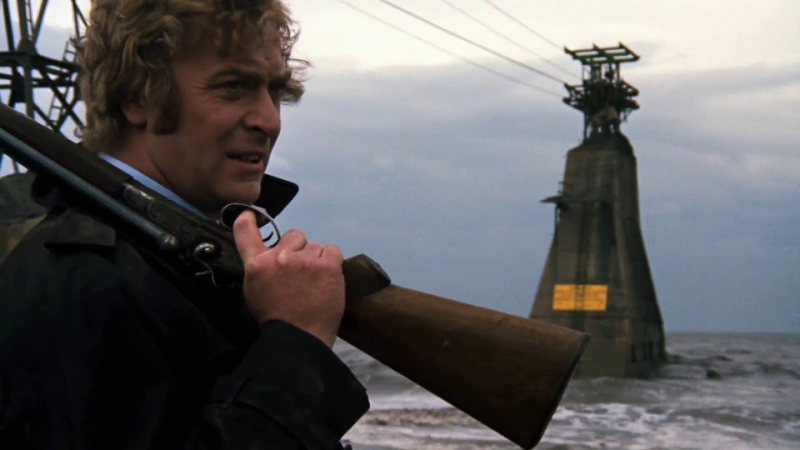Director – Mike Hodges – 1971 – UK – Cert. 18 – 111m
*****
A London gangster takes the train to Newcastle to find out who killed his brother… and why… in a defining film for both Michael Caine and British cinema – back out in cinemas on Friday, May 27th
Fifty years old, Hodges’ first feature has aged well in the main. Viewed today, this gangster film has a lot going for it. It reduces London to seedy, windowless rooms where men watch pornographic slide shows or their unfaithful wives service their lovers’ sexual fantasies over long distance phone calls. After the opening London to Newcastle train journey to the strains of Roy Budd’s memorable score, It quickly settles into its Newcastle milieu of pub interiors, terraced houses, rented rooms, back to back streets, pedestrians, cars, harbours and ferries. It has a memorable finale in which one man pursues another across a beach to a coal heap.
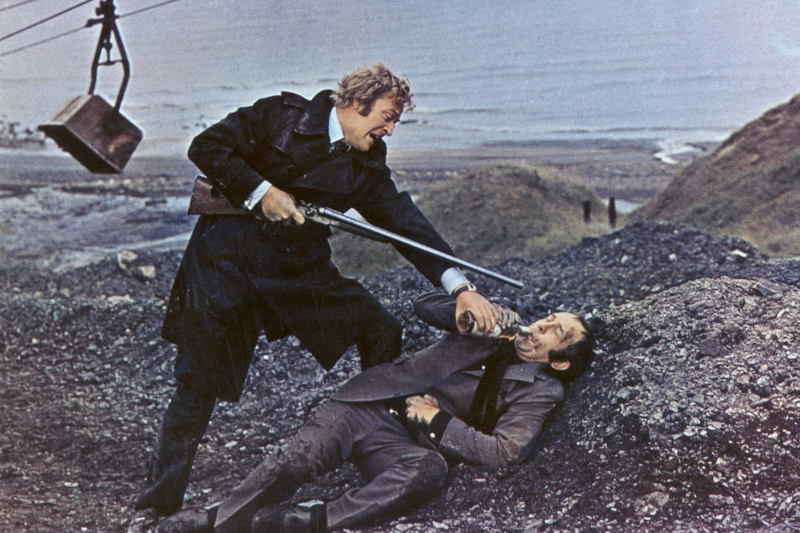
There’s a background about prostitution which turns out to be highly significant to the plot, with histories of men luring girls into pornographic movies. Few of the women (Britt Ekland, Rosemary Dunham, Petra Markham) seem happy – they are sex objects to service the men, or prostitutes, or victims of male trickery. The one seeming free-spirit (Geraldine Moffat) turns out to be not so free and comes to a sticky end. In the final reel, another (Dorothy White) – forced to strip to her knickers – has what is presumably an item of her clothing stuffed in her mouth before being killed by an injection. The film trades to some extent in misogyny, and this aspect of it has perhaps aged less well than everything else here.
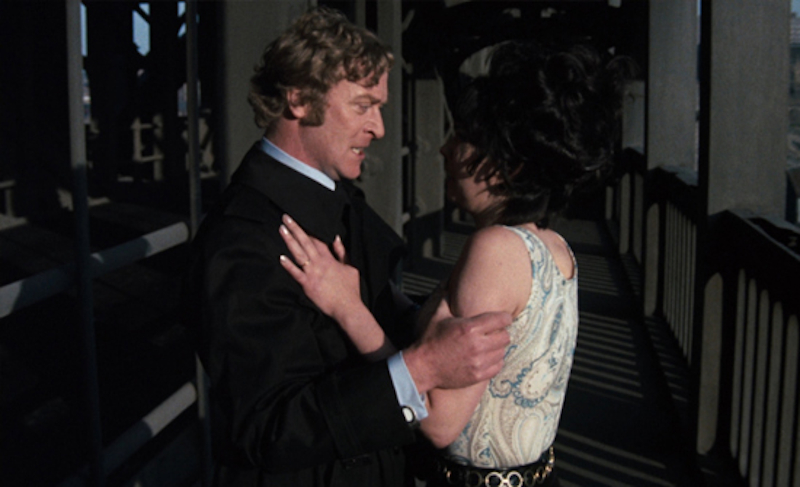
It does however feature some astonishing male underworld bit parts from, among others, Ian Hendry, George Sewell, Tony Beckley, Alun Armstrong, Bryan Mosley and a surprisingly effective turn from playwright John Osborne as a Northern gangland boss. All these, however, are overshadowed by the film’s star Michael Caine. Indeed, it’s hard to imagine what this film would have been like were his part, Carter, played by another actor. Carter’s way of dealing with bereavement is to find out what happened to his late brother, who he is convinced was the victim of foul play, and exact revenge on the perpetrator or perpetrators. He’s a nasty bit of work, sleeping with a woman who rescued him in a car only to later bundle her into the car’s boot, prepared to stop at nothing in pursuit of his self-administered justice.
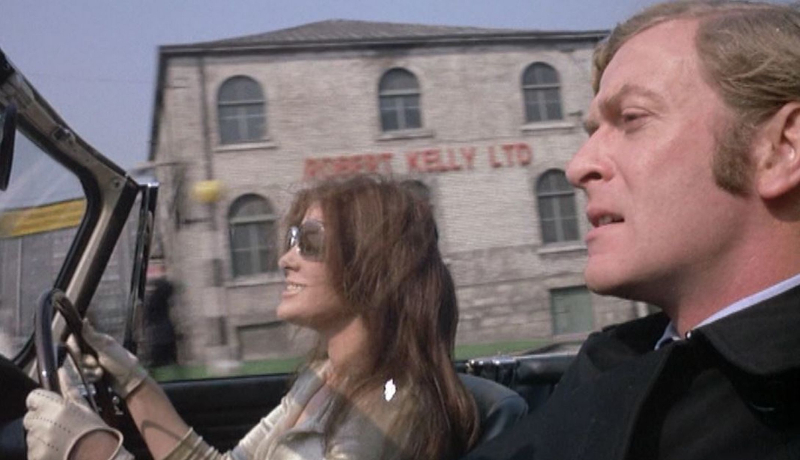
Caine carries all this off with what can only be described as ‘cool’; something happens between him and the camera. His character is undoubtedly unpleasant, yet he’s also, in the American parlance, “someone to root for” and root for him we do. His rough, London accent is never a caricature just as the Northern accents around him aren’t. There’s a solidity here, a feeling of someone not to be messed with, a single-minded force who knows what he’s after and isn’t going to stop ’til he gets it and his thirst for revenge has been sated. Caine lends Carter a down-to-earth quality, a gravitas.
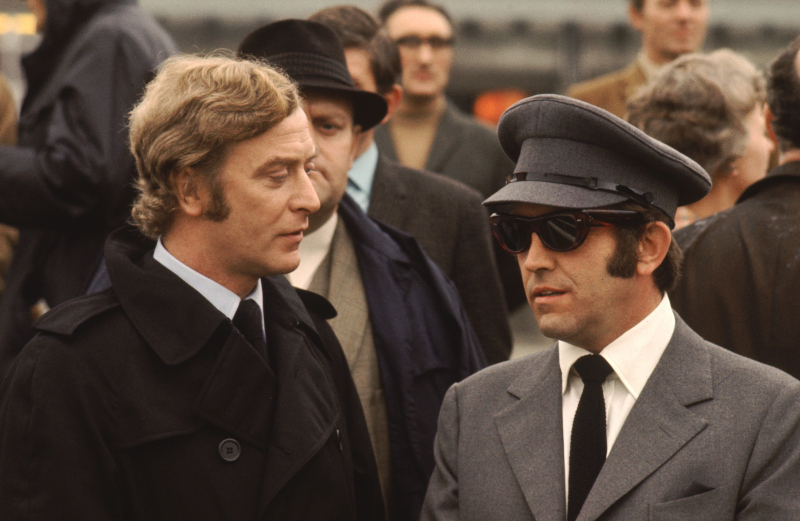
Bad things happen to various people who try and help him, yet somehow we remain on Jack Carter’s side, even though he’s probably not a good person to know if you want to live a long and happy life. There’s no playing the Caine persona for laughs here like there was when he says, “you’re only supposed to blow the bloody doors off” in The Italian Job (Peter Collinson, 1969), there’s no heroism: he’s determined, he’s ruthless. And yet, his presence on the screen is completely magnetic.
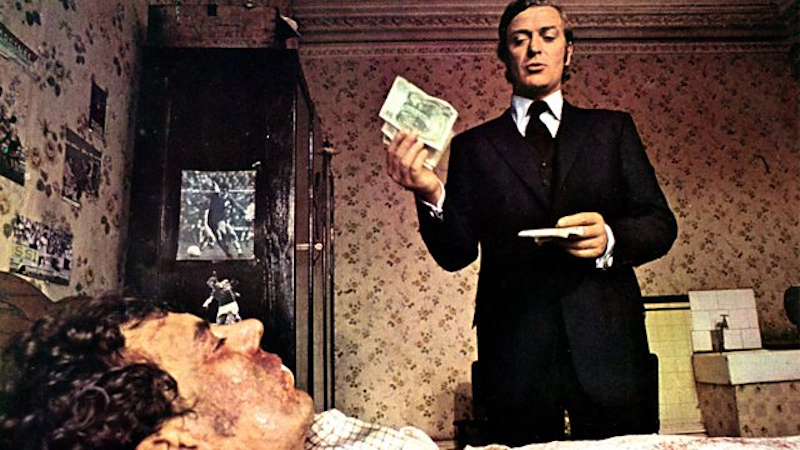
It helps that writer-director Hodges has some sort of vision and knows how to cast the right actors to realise it. This is not the twee England of the Ealing comedies with their loveable rogues, it’s something much more harsh and brutal which Caine and Hodges’ mostly spot on supporting male cast bring together on the screen under his directorial guidance. Perhaps it’s a working class thing – most of the characters feel like they’ve got where they are by starting from humble beginnings. A pair of architects complaining they may not get their fee after their client has disappeared feel irrelevant to everything else, as if they’ve wandered in from a rarefied and alien, professional, British middle class world. Meanwhile the witless police, symbols of the establishment, are manipulated so they turn up to do the by villains’ bidding without knowing it. At the centre of it all though is the iconic Caine, at once level-headed, focused and, perhaps most significantly, cool.
Get Carteris back out in cinemas in a 4K restoration in the UK on Friday, May 27th.
Trailer (2022):
Trailer (1971):
